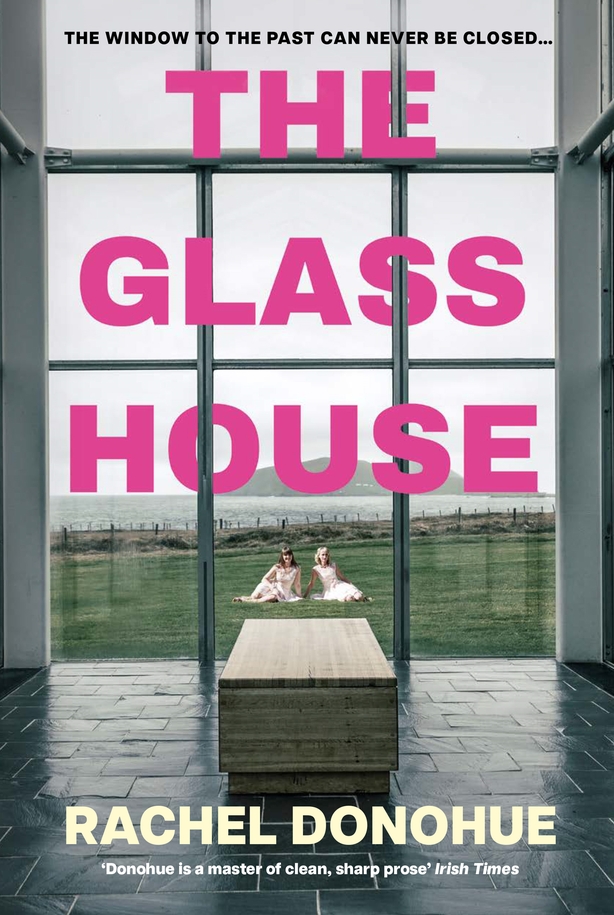We present the first chapter from The Glass House, the new novel from by Rachel Donohue, author of The Temple House Vanishing.
Moving from the West of Ireland to Dublin, London, Florence and back, The Glass House is a compelling tale of two sisters and their secrets, of love, regret and vengeance.
1963: At the stark and isolated modernist mansion of controversial political philosopher Richard Acklehurst, the glittering annual New Year party has not gone quite as planned. Considered a genius by some, and something far darker by others, by the end of the evening Acklehurst will be dead in mysterious circumstances, casting a long shadow over the lives of his teenage daughters, Aisling and Stella.
1999: Richard Acklehurst's remains are defiled in the country graveyard where they have lain undisturbed for over thirty years, forcing his daughters to return to their childhood home where they must finally confront the complex and dark dynamic at the heart of their family.
We watched the guests arrive from our perch on the balcony. The cars came, always slowly, as if attending a funeral, hesitantly navigating the potholed and uneven surface of the lane, past the lake ringed by the willows. The women would emerge first, hunched and tired, irritation across their fur-clad shoulders; an impatient gaze flicked to a grey sky. I'd squeeze my eyes shut at the sight of them and press my head to the steel railing in a sort of blind prayer; while Stella, my younger sister, would reach out a hand as if to touch them.
Our house must have seemed a nowhere place. The guests came to us from empires which had collapsed or burned away; all their borders re-imagined and the space for them limited now, constrained. Worlds disappear and people are forever searching for the past, for someone who remembers. I learned that early. It’s why my father was important to them, and our house, the Glass House, became their refuge, a lost ocean liner, moored up in the marsh.
Once inside, admiration would burst forth, the mood ever changeable. Different languages floating upwards, words we understood and some we did not. They were seeking something from him. We did know that, almost before we knew anything else about who or what our father was, and we came to understand the visits were a kind of pilgrimage. The people had come to learn something from the master, and he would anoint them for a while.
We played our part too, never quite as innocent as they may have imagined. Dressed one in yellow and the other in midnight blue satin, thin legs dangling from the couch, we’d recite poems in faltering Irish, a language they did not know – nor did we – and be greeted by a sea of frowns on pale, tight foreheads. Our father would describe us then as day and night, and everyone would clap. Our lives with him a sort of public performance, a coded merit system at play; and we’d hold hands, she and I, trapped in their gaze, distorted reflections of each other, and of him too.
When it got late he would retreat to the fireplace and the portrait of my mother which hung above; she with head tilted and eyes shaded under a mulberry-coloured hat. He’d touch the bottom frame very gently as if checking for dust, and a new chapter of the evening would begin then. The man from Lisbon would play the baby grand piano by the long windows and Stella would sing. Her fair curls, just like our mother’s, bouncing and glimmering by the open fire, and Father, tears in his eyes, would bend low and reward her with an oyster.
The next morning, out for a walk in the gardens with Siobhan who looked after us, we’d find little clues to the unravelling of the night before – a broken crystal goblet on the steps, a silk scarf draped along the terrace wall. Siobhan would make a sign of the cross then. Our oddly shaped glass house was stricken with bad luck apparently – had we not seen the lone hawthorn in the fairy field?
But we were from somewhere else so the signs and symbols of this ancient place had no real meaning. And besides, we had just escaped from a war, the world had burned down and our mother was dead. How much more bad luck could there be? So on those mornings, after the night before, we didn’t feel cursed and would stand instead on the wet, dewy grass and look upwards. Dazzled by the brightness of this ode to modernism of a house, which shimmered and swayed in the winter light – a strange entity of moving curves and steel.
Our guests meanwhile would sleep off their excesses, rising after noon and demanding English newspapers. I never thought them glamorous. The women looked like painted dolls, dead-eyed and cracked in the daylight. They were thin because there was still little food in the places they travelled from; hunger in their startled brows and a craving for their lives before the war hung in the pearls around their neck. The men were preposterous, red-faced, their bodies like extravagant exclamations that burst out of dinner jackets, and when they reached for you their hot, slippery words tickled your neck. They were not hungry, but instead overflowing with something.
Stella always thought of them differently to me, however. She collected their lost and forgotten belongings from the garden and stored them in a hat box under her bed. Perhaps it was the fatal curiosity and romance of her nature, the morning part of her that perceived grandeur. I, meanwhile, saw only their secrets.

The Glass House is published by Corvus

